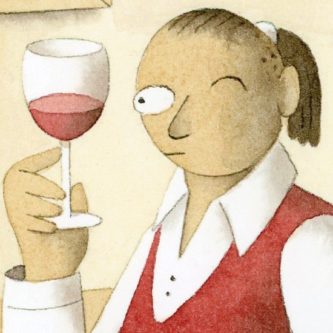The mainstreaming of natural wines has brought niche winemakers capital and celebrity, as well as questions about their personalities and politics.
By Rachel Monroe | From November 25, 2019 Issue of the American Chronicles.

In 2010, Dani Rozman had just graduated from the University of Wisconsin. He was so deliberate and thoughtful that his friends claimed it was inevitable that he’d end up a history professor with a closet full of cardigans. But Rozman went to Argentina instead, and wound up in Mendoza, the hub of the country’s wine scene, working at a startup that helped wealthy people realize their wine dreams—you could buy a vineyard from afar, have someone else farm it, design the labels, and receive cases of “your” wine to show off at dinner parties.
One summer, Rozman went to Itata, at the southern tip of Chile’s wine-producing region, to work the grape harvest at a local winery. He had the impression that winemakers were like the clean-cut guys in Napa with family money and fleece vests. Itata was different. The winery was just a shipping container and a mesh tent, and the work was non-stop. Rozman had grown up in a health-conscious family that nonetheless “had to be reminded that food was farmed,” he said; being in daily contact with plants felt revelatory. Some of the vines had been planted centuries earlier, by conquistadores and missionaries. The grapes were País, a varietal that had fallen out of favour as winemakers turned to popular ones like Cabernet Sauvignon. The methods were traditional, too—the fruit was picked by hand, destemmed with a bamboo implement called a zaranda, then fermented in clay pots. The finished product was startling, in a good way. “At that time in Argentina, Malbec was king,” Rozman told me. The country made lots of homogeneous, high-alcohol wines aged in oak barrels, catering to international appetites—“the French-consultant thing,” as Rozman put it. To him, they tasted heavy and expressionless, while the Itata wines were stripped down and elemental. “It was like night and day,” he said.
Artisanal wines had already found a following in European and Japanese cities and were beginning to win converts in the United States, too. Their novelty lay precisely in the makers’ veneration of tradition, their rejection of the high-tech methods that many conventional vintners relied on. The wines were typically made with organic grapes, using no added yeast, no filtration, no chemical additives, no new oak barrels, no mechanical manipulations. The wines were variously described as low-intervention, naked, or raw; the term that eventually stuck was “natural.”
In the past few years, natural wines have acquired a hipster cachet, with natural-wine bars popping up in cities from Seattle to Kansas City and Helena, Montana. Kasimir Bujak, a buyer for the Wine Source, a store in Baltimore, told me, “It’s a trickle-down effect from Brooklyn—and that means people in Columbus are going to be drinking it next.”
Rozman said, “Ten years ago, people in their twenties weren’t hanging out at wine bars. Now they’re packed.” In the Napa boom of the nineteen-nineties, consumers prized wines that were rich and flawless. Now they’re seeking out wines that are more expressive than correct; wines that are earthy, with visible sediment; wines that taste alive.
Read the full story on the New Yorker website.




 Thank you to all those who have volunteered to be part of the glasses roster.
Thank you to all those who have volunteered to be part of the glasses roster.
 Cellar Club Inc – Annual General Meeting
Cellar Club Inc – Annual General Meeting We hope all members are coming out of the hibernation that was COVID19 lockdown levels 4-3 and are looking forward to some normality re-energising their lives. We are now allowed to meet and lots happening so let me set things out for you. Firstly a major change is planned with Evelyn Dawson taking over the Editorship of your Newsletter. Evelyn has other commitments and will not be joining the committee, we are however, very keen to seek a new member or two into the committee with both Steve and Robin withdrawing. Think about it, please.
We hope all members are coming out of the hibernation that was COVID19 lockdown levels 4-3 and are looking forward to some normality re-energising their lives. We are now allowed to meet and lots happening so let me set things out for you. Firstly a major change is planned with Evelyn Dawson taking over the Editorship of your Newsletter. Evelyn has other commitments and will not be joining the committee, we are however, very keen to seek a new member or two into the committee with both Steve and Robin withdrawing. Think about it, please.


